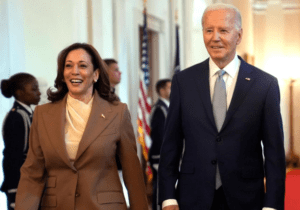By Chris KONEY
Leading to the much anticipated American elections on December 7, I had conversations with various friends and professionals representing diverse American sectors on the possibility of Kamala Devi Harris becoming the next and first female president of the United States of America.

A member of the Democratic Party and a distinguished professional known for her dynamic leadership and extensive expertise in the energy sector, Beatrice Mensah-Tayui, was convinced it was time for Americans to choose competence and give the nod to Kamala Harris.
She had earlier urged Americans to vote for Kamala Devi Harris to become the next president of the United States of America during the Democratic National Convention in Chicago, Illinois in August 2024. Ms. Mensah-Tayui made a passionate appeal to Democratic Delegates from the state of Pennsylvania to go out in their numbers to vote on Election Day.
Oral Kwame Ofori, professionally known as Oral Ofori, is a Ghanaian-American award-winning digital media producer and blogger, freelance journalist, entrepreneur and writer. He is also the founder of the US-based communication consultancy, TheAfricanDream LLC.
Oral had highlighted the dynamics with regard Hillary –Trump competition which saw Trump becoming America’s president for his first term. According to him, Hillary was projected to win per the polls which unfortunately didn’t happen. Trump’s victory was largely attributed to voter apathy among Democrats.
Going into the December 7 election, if American voters elected Kamala Harris, a Black Asian American woman – president, it would have been historic on multiple levels. This seemed to be a real possibility due to voters’ positively evolving stereotypes of women politicians highlighted by several polls.
Stereotypes have long hindered female candidates, casting them as emotional, weak and sensitive. But recent political science research has revealed that voters in the United States increasingly see women leaders as synonymous with political leadership – and as more effective than men politicians.
This transformation reflected a supposed broader change in what voters expect in political leaders. However, the question still remains, when will Americans see a woman candidate as a better ‘fit’ for the office of the president? Are we going to see a woman break through the highest glass ceiling in U.S. politics any time soon?
The classic double bind
Gender stereotypes are the assumptions and expectations people have about men and women. They traditionally present an obstacle for women leaders, including in politics.
Among the many barriers to a woman becoming president in the U.S. are voters’ gender stereotypes. Men are generally assumed to have masculine traits such as being ambitious and competitive, while women are assumed to possess feminine traits such as being warm and compassionate. In applying gender stereotypes to politicians, voters end up with very different expectations for men and women candidates.
This presents a classic double bind for women leaders. If they behave like leaders and act dominantly and assertively, they violate expectations of femininity. But if they behave in a stereotypical way, they are not seen as strong leaders.
The double bind extends to politics. It was long the case that stereotypes of men politicians, but not women politicians, aligned with the leadership qualities that voters desire in political leaders.
These traits include competence, strong leadership, empathy and integrity. A 2011 study showed that stereotypes of women politicians lacked clarity, meaning people had no clear expectations. Voters also did not see women politicians in alignment with those same four leadership qualities that voters seek.
But by 2021, prominent women political leaders such as Hillary Clinton, Nikki Haley and Nancy Pelosi had reshaped the landscape for women seeking office by shaping and solidifying public expectations.
More women politicians now
More women have assumed political leadership roles in the U.S. over the past decade than in previous decades. The number of women in Congress increased from 90 to 145 between the 111th Congress, which met from 2009 to 2011, to the 117th Congress, which met from 2021 to 2023.
In addition, high-profile women politicians such as Democrats Pelosi and Clinton as well as Liz Cheney – a Republican, have received considerable attention from both the media and the electorate. Gender stereotypes about women politicians evolved from being ambiguous to becoming both well-defined and positive as voters grew more familiar with them. This has created a political landscape for Harris today that is notably different from the early 2010s.
There are political scientists whose research examines how gender stereotypes affect women’s political underrepresentation. In 2021, we conducted a study of how voters’ gender stereotypes of politicians had evolved over the previous decade. These are the three main lessons:
Positive stereotypes of women politicians
A decade ago, people did not agree on the traits that defined women politicians. While some people described them as tough, others thought they were weak. Similarly, some reported them as rational, while others saw them as unable to separate feelings from ideas. There were no traits that large groups of people agreed upon to describe women politicians. But studies show that voters now hold clear and positive stereotypes of them.
When asked about the traits they associate with women politicians, respondents listed positive traits such as intelligent, rational, analytical, ambitious and moral. At the same time, women politicians are least associated with negative traits such as being weak and spineless.
Negative stereotypes of men politicians
Male politicians were previously seen as confident, well educated, charismatic and driven. But there’s bad news for men in politics: This perception has shifted. Studies have revealed that stereotypes of male politicians became much more negative over the decade we studied.
Today, male politicians are more commonly viewed as power-hungry, selfish, manipulative and self-interested. They are least associated with traits such as being sympathetic or caring about “people like me”. This indicates that voters have become more negative and distrustful toward male politicians.
Perceptions on leadership qualities of women politicians
In the past, stereotypes of women politicians were incompatible with leadership stereotypes. But studies show that this mismatch has subsided. In fact, between 2011 and 2021, scores for women politicians increased on all four leadership traits valued by voters: competence, leadership, empathy and integrity.
Men politicians, in contrast, have lost ground on all four leadership traits. Women politicians now surpass men politicians in three out of the four leadership traits: competence, empathy and integrity. Expectations of men politicians concerning the fourth trait, strong leadership, are now equal to those of female politicians.
>>>Chris is a thought leader in Marketing Communications, Stakeholder Relationship Management Professional and International Cooperation Specialist. Over the last fifteen (15) years, he has made tremendous impact within Africa’s corporate communications and creative arts sectors. He can be reached at [email protected] / +233 20 854 1480.










